MBA402 - Governance, Ethics, and Sustainability: RFG Code of Conduct
VerifiedAdded on 2022/12/29
|11
|2364
|73
Report
AI Summary
This report presents a comprehensive Code of Conduct for Retail Food Group (RFG), a consumer-oriented food and beverage company. The code addresses crucial aspects of corporate governance, including discrimination, exploitation, corruption, dishonest and fraudulent behavior, and whistleblower protections. The document emphasizes the importance of honesty, integrity, and accountability for all employees and directors. It outlines principles related to equal opportunities, confidentiality, and food safety, referencing relevant legislation and case law. The code's enforcement and compliance mechanisms are also detailed, ensuring adherence to ethical standards and legal requirements. The report integrates a minimum of 15 references, including academic journals and textbooks, to support the code's principles and guidelines. This assignment provides a framework for RFG to promote ethical conduct and maintain its commitment to societal contributions in economic, social, and environmental domains.
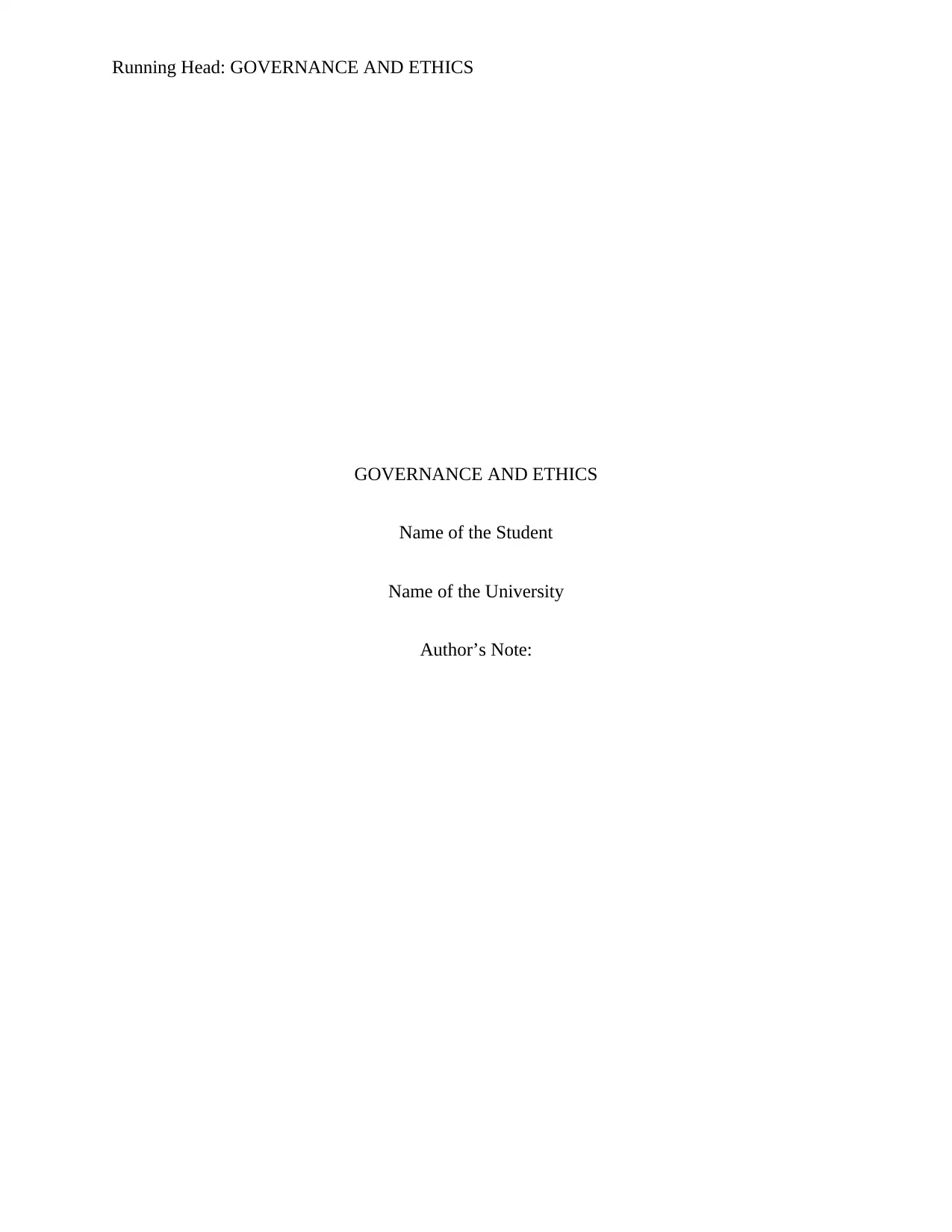
Running Head: GOVERNANCE AND ETHICS
GOVERNANCE AND ETHICS
Name of the Student
Name of the University
Author’s Note:
GOVERNANCE AND ETHICS
Name of the Student
Name of the University
Author’s Note:
Paraphrase This Document
Need a fresh take? Get an instant paraphrase of this document with our AI Paraphraser
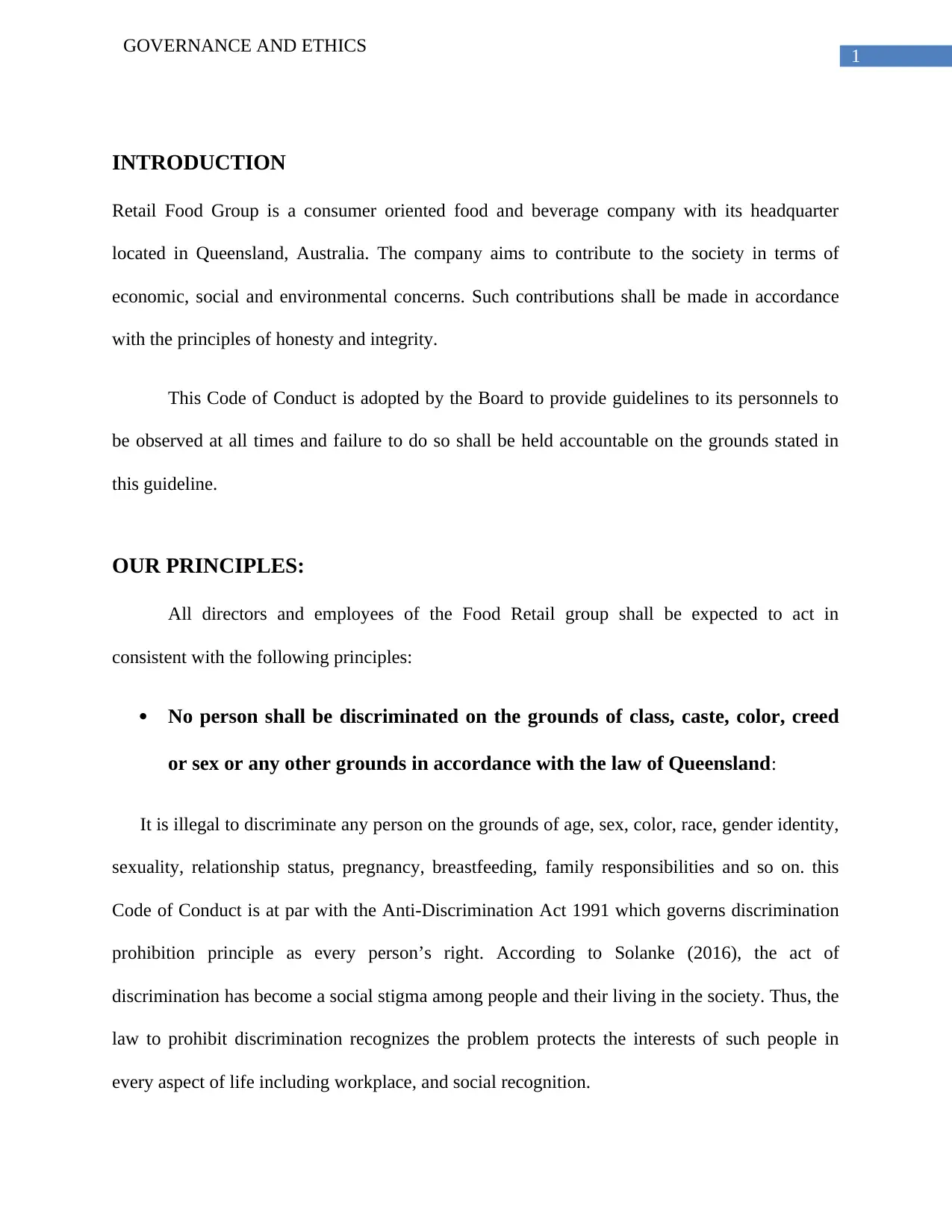
1
GOVERNANCE AND ETHICS
INTRODUCTION
Retail Food Group is a consumer oriented food and beverage company with its headquarter
located in Queensland, Australia. The company aims to contribute to the society in terms of
economic, social and environmental concerns. Such contributions shall be made in accordance
with the principles of honesty and integrity.
This Code of Conduct is adopted by the Board to provide guidelines to its personnels to
be observed at all times and failure to do so shall be held accountable on the grounds stated in
this guideline.
OUR PRINCIPLES:
All directors and employees of the Food Retail group shall be expected to act in
consistent with the following principles:
No person shall be discriminated on the grounds of class, caste, color, creed
or sex or any other grounds in accordance with the law of Queensland:
It is illegal to discriminate any person on the grounds of age, sex, color, race, gender identity,
sexuality, relationship status, pregnancy, breastfeeding, family responsibilities and so on. this
Code of Conduct is at par with the Anti-Discrimination Act 1991 which governs discrimination
prohibition principle as every person’s right. According to Solanke (2016), the act of
discrimination has become a social stigma among people and their living in the society. Thus, the
law to prohibit discrimination recognizes the problem protects the interests of such people in
every aspect of life including workplace, and social recognition.
GOVERNANCE AND ETHICS
INTRODUCTION
Retail Food Group is a consumer oriented food and beverage company with its headquarter
located in Queensland, Australia. The company aims to contribute to the society in terms of
economic, social and environmental concerns. Such contributions shall be made in accordance
with the principles of honesty and integrity.
This Code of Conduct is adopted by the Board to provide guidelines to its personnels to
be observed at all times and failure to do so shall be held accountable on the grounds stated in
this guideline.
OUR PRINCIPLES:
All directors and employees of the Food Retail group shall be expected to act in
consistent with the following principles:
No person shall be discriminated on the grounds of class, caste, color, creed
or sex or any other grounds in accordance with the law of Queensland:
It is illegal to discriminate any person on the grounds of age, sex, color, race, gender identity,
sexuality, relationship status, pregnancy, breastfeeding, family responsibilities and so on. this
Code of Conduct is at par with the Anti-Discrimination Act 1991 which governs discrimination
prohibition principle as every person’s right. According to Solanke (2016), the act of
discrimination has become a social stigma among people and their living in the society. Thus, the
law to prohibit discrimination recognizes the problem protects the interests of such people in
every aspect of life including workplace, and social recognition.
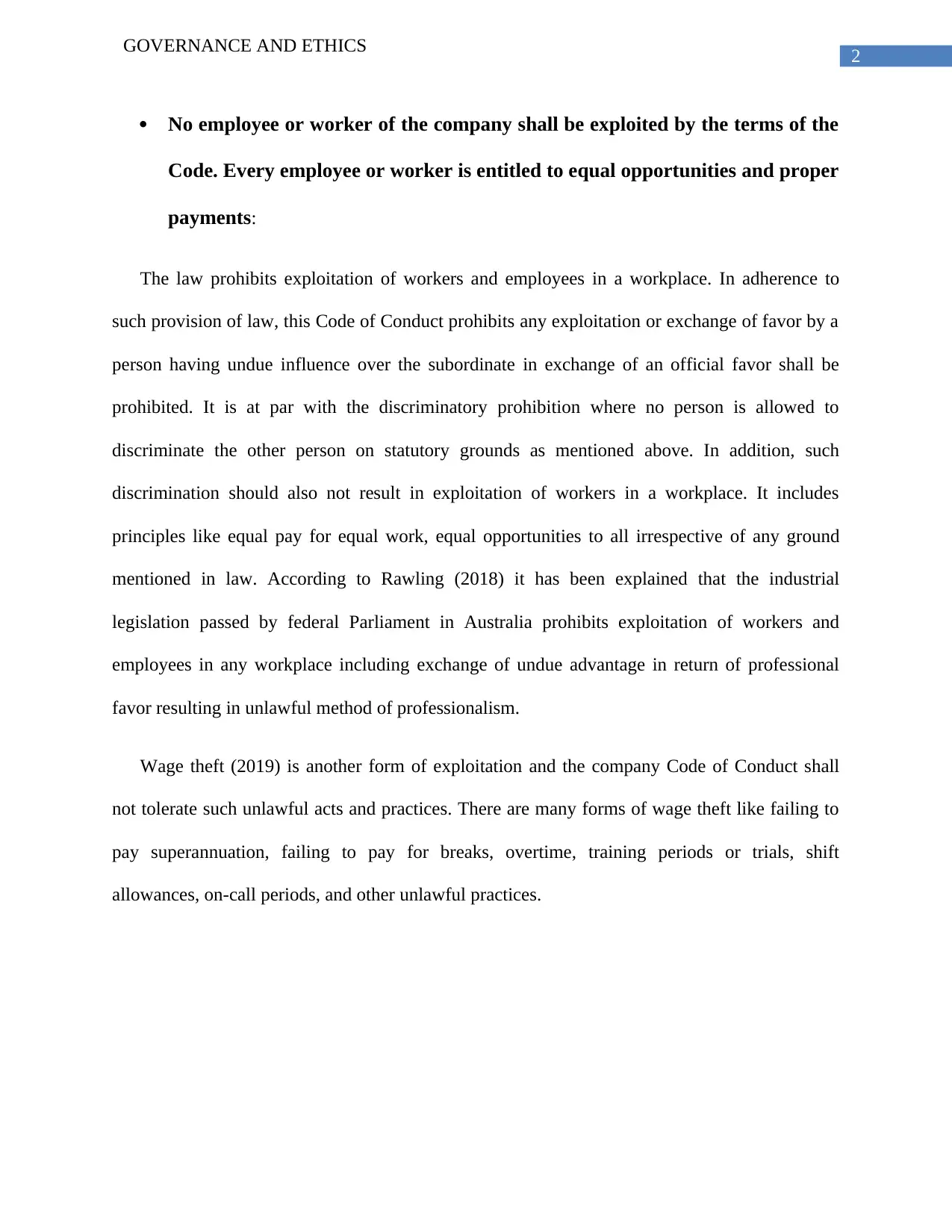
2
GOVERNANCE AND ETHICS
No employee or worker of the company shall be exploited by the terms of the
Code. Every employee or worker is entitled to equal opportunities and proper
payments:
The law prohibits exploitation of workers and employees in a workplace. In adherence to
such provision of law, this Code of Conduct prohibits any exploitation or exchange of favor by a
person having undue influence over the subordinate in exchange of an official favor shall be
prohibited. It is at par with the discriminatory prohibition where no person is allowed to
discriminate the other person on statutory grounds as mentioned above. In addition, such
discrimination should also not result in exploitation of workers in a workplace. It includes
principles like equal pay for equal work, equal opportunities to all irrespective of any ground
mentioned in law. According to Rawling (2018) it has been explained that the industrial
legislation passed by federal Parliament in Australia prohibits exploitation of workers and
employees in any workplace including exchange of undue advantage in return of professional
favor resulting in unlawful method of professionalism.
Wage theft (2019) is another form of exploitation and the company Code of Conduct shall
not tolerate such unlawful acts and practices. There are many forms of wage theft like failing to
pay superannuation, failing to pay for breaks, overtime, training periods or trials, shift
allowances, on-call periods, and other unlawful practices.
GOVERNANCE AND ETHICS
No employee or worker of the company shall be exploited by the terms of the
Code. Every employee or worker is entitled to equal opportunities and proper
payments:
The law prohibits exploitation of workers and employees in a workplace. In adherence to
such provision of law, this Code of Conduct prohibits any exploitation or exchange of favor by a
person having undue influence over the subordinate in exchange of an official favor shall be
prohibited. It is at par with the discriminatory prohibition where no person is allowed to
discriminate the other person on statutory grounds as mentioned above. In addition, such
discrimination should also not result in exploitation of workers in a workplace. It includes
principles like equal pay for equal work, equal opportunities to all irrespective of any ground
mentioned in law. According to Rawling (2018) it has been explained that the industrial
legislation passed by federal Parliament in Australia prohibits exploitation of workers and
employees in any workplace including exchange of undue advantage in return of professional
favor resulting in unlawful method of professionalism.
Wage theft (2019) is another form of exploitation and the company Code of Conduct shall
not tolerate such unlawful acts and practices. There are many forms of wage theft like failing to
pay superannuation, failing to pay for breaks, overtime, training periods or trials, shift
allowances, on-call periods, and other unlawful practices.
⊘ This is a preview!⊘
Do you want full access?
Subscribe today to unlock all pages.

Trusted by 1+ million students worldwide
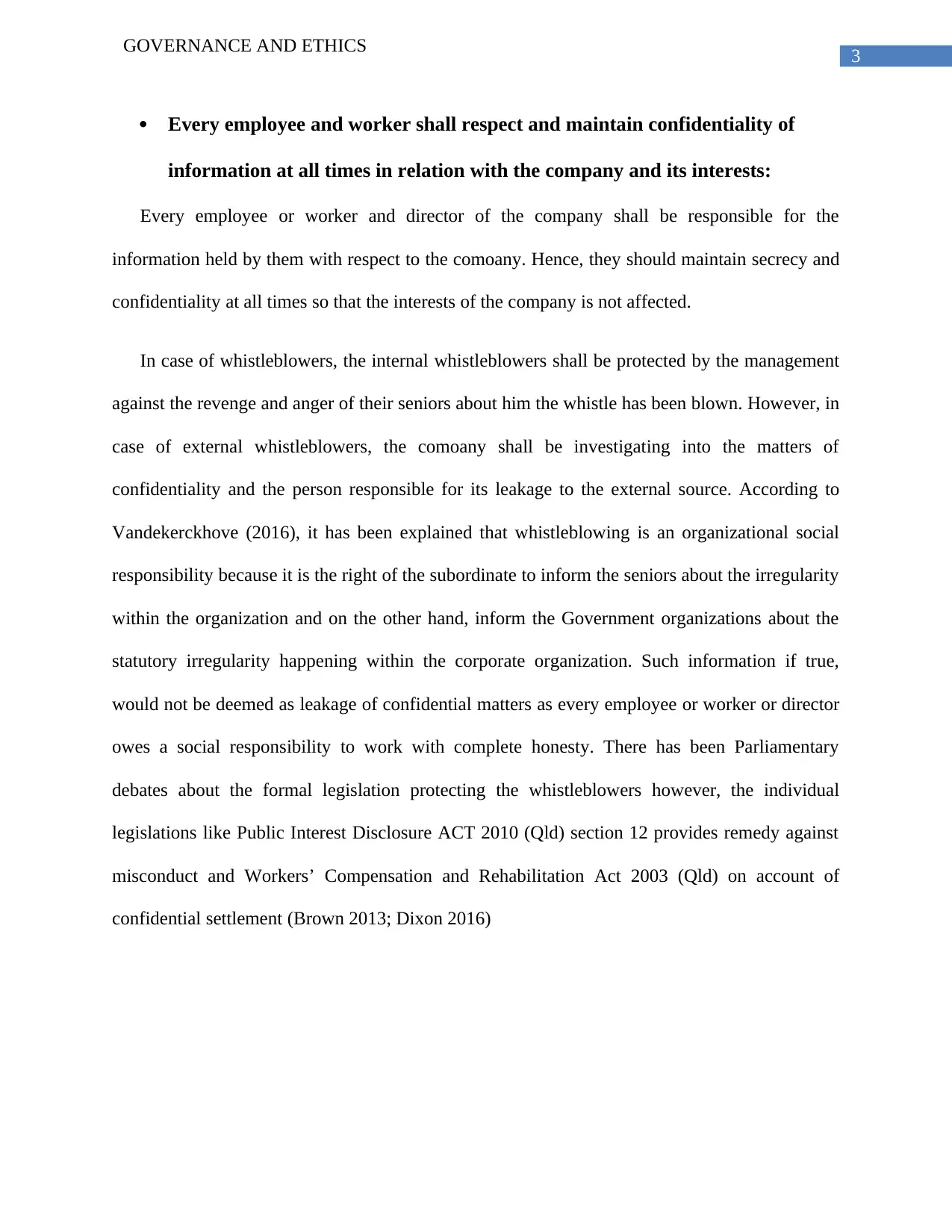
3
GOVERNANCE AND ETHICS
Every employee and worker shall respect and maintain confidentiality of
information at all times in relation with the company and its interests:
Every employee or worker and director of the company shall be responsible for the
information held by them with respect to the comoany. Hence, they should maintain secrecy and
confidentiality at all times so that the interests of the company is not affected.
In case of whistleblowers, the internal whistleblowers shall be protected by the management
against the revenge and anger of their seniors about him the whistle has been blown. However, in
case of external whistleblowers, the comoany shall be investigating into the matters of
confidentiality and the person responsible for its leakage to the external source. According to
Vandekerckhove (2016), it has been explained that whistleblowing is an organizational social
responsibility because it is the right of the subordinate to inform the seniors about the irregularity
within the organization and on the other hand, inform the Government organizations about the
statutory irregularity happening within the corporate organization. Such information if true,
would not be deemed as leakage of confidential matters as every employee or worker or director
owes a social responsibility to work with complete honesty. There has been Parliamentary
debates about the formal legislation protecting the whistleblowers however, the individual
legislations like Public Interest Disclosure ACT 2010 (Qld) section 12 provides remedy against
misconduct and Workers’ Compensation and Rehabilitation Act 2003 (Qld) on account of
confidential settlement (Brown 2013; Dixon 2016)
GOVERNANCE AND ETHICS
Every employee and worker shall respect and maintain confidentiality of
information at all times in relation with the company and its interests:
Every employee or worker and director of the company shall be responsible for the
information held by them with respect to the comoany. Hence, they should maintain secrecy and
confidentiality at all times so that the interests of the company is not affected.
In case of whistleblowers, the internal whistleblowers shall be protected by the management
against the revenge and anger of their seniors about him the whistle has been blown. However, in
case of external whistleblowers, the comoany shall be investigating into the matters of
confidentiality and the person responsible for its leakage to the external source. According to
Vandekerckhove (2016), it has been explained that whistleblowing is an organizational social
responsibility because it is the right of the subordinate to inform the seniors about the irregularity
within the organization and on the other hand, inform the Government organizations about the
statutory irregularity happening within the corporate organization. Such information if true,
would not be deemed as leakage of confidential matters as every employee or worker or director
owes a social responsibility to work with complete honesty. There has been Parliamentary
debates about the formal legislation protecting the whistleblowers however, the individual
legislations like Public Interest Disclosure ACT 2010 (Qld) section 12 provides remedy against
misconduct and Workers’ Compensation and Rehabilitation Act 2003 (Qld) on account of
confidential settlement (Brown 2013; Dixon 2016)
Paraphrase This Document
Need a fresh take? Get an instant paraphrase of this document with our AI Paraphraser
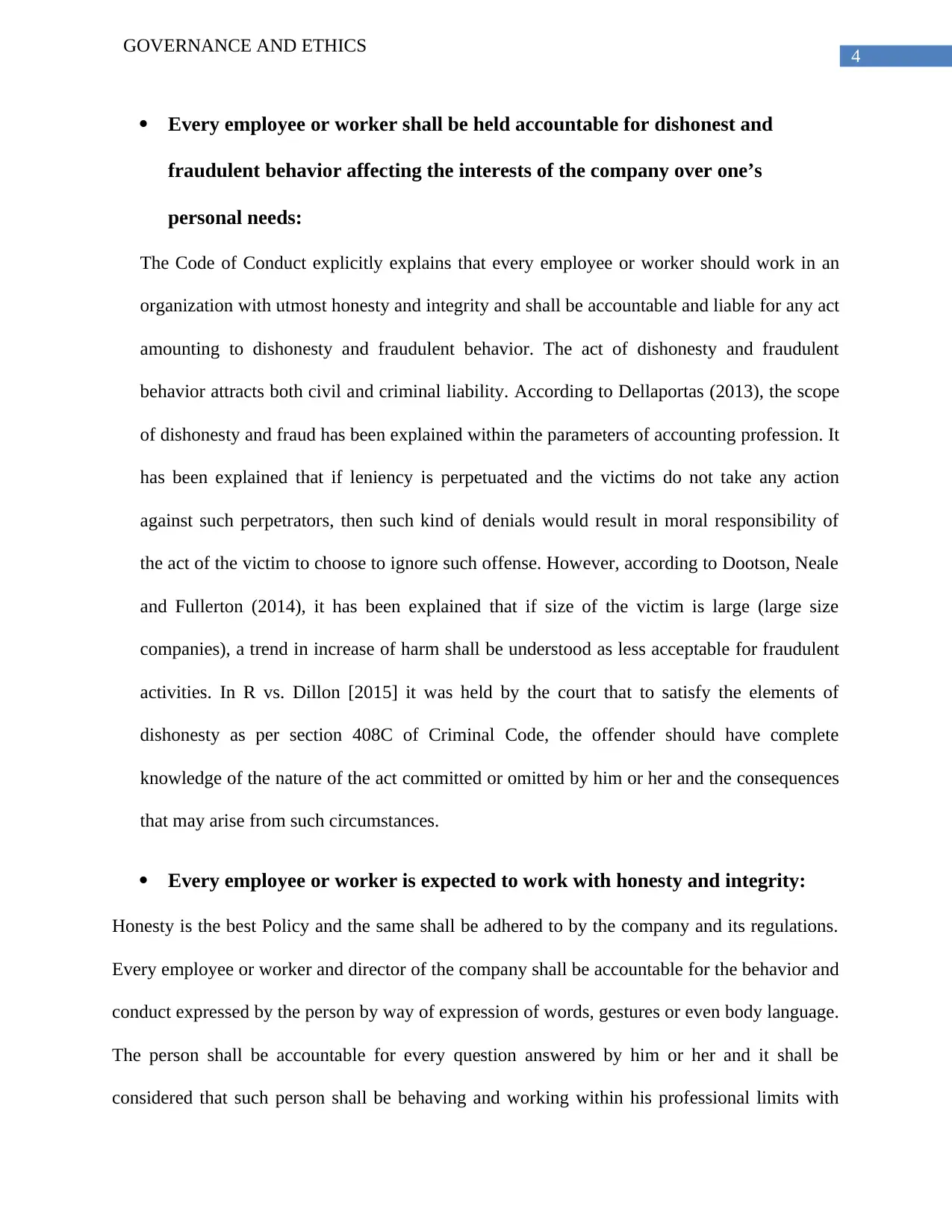
4
GOVERNANCE AND ETHICS
Every employee or worker shall be held accountable for dishonest and
fraudulent behavior affecting the interests of the company over one’s
personal needs:
The Code of Conduct explicitly explains that every employee or worker should work in an
organization with utmost honesty and integrity and shall be accountable and liable for any act
amounting to dishonesty and fraudulent behavior. The act of dishonesty and fraudulent
behavior attracts both civil and criminal liability. According to Dellaportas (2013), the scope
of dishonesty and fraud has been explained within the parameters of accounting profession. It
has been explained that if leniency is perpetuated and the victims do not take any action
against such perpetrators, then such kind of denials would result in moral responsibility of
the act of the victim to choose to ignore such offense. However, according to Dootson, Neale
and Fullerton (2014), it has been explained that if size of the victim is large (large size
companies), a trend in increase of harm shall be understood as less acceptable for fraudulent
activities. In R vs. Dillon [2015] it was held by the court that to satisfy the elements of
dishonesty as per section 408C of Criminal Code, the offender should have complete
knowledge of the nature of the act committed or omitted by him or her and the consequences
that may arise from such circumstances.
Every employee or worker is expected to work with honesty and integrity:
Honesty is the best Policy and the same shall be adhered to by the company and its regulations.
Every employee or worker and director of the company shall be accountable for the behavior and
conduct expressed by the person by way of expression of words, gestures or even body language.
The person shall be accountable for every question answered by him or her and it shall be
considered that such person shall be behaving and working within his professional limits with
GOVERNANCE AND ETHICS
Every employee or worker shall be held accountable for dishonest and
fraudulent behavior affecting the interests of the company over one’s
personal needs:
The Code of Conduct explicitly explains that every employee or worker should work in an
organization with utmost honesty and integrity and shall be accountable and liable for any act
amounting to dishonesty and fraudulent behavior. The act of dishonesty and fraudulent
behavior attracts both civil and criminal liability. According to Dellaportas (2013), the scope
of dishonesty and fraud has been explained within the parameters of accounting profession. It
has been explained that if leniency is perpetuated and the victims do not take any action
against such perpetrators, then such kind of denials would result in moral responsibility of
the act of the victim to choose to ignore such offense. However, according to Dootson, Neale
and Fullerton (2014), it has been explained that if size of the victim is large (large size
companies), a trend in increase of harm shall be understood as less acceptable for fraudulent
activities. In R vs. Dillon [2015] it was held by the court that to satisfy the elements of
dishonesty as per section 408C of Criminal Code, the offender should have complete
knowledge of the nature of the act committed or omitted by him or her and the consequences
that may arise from such circumstances.
Every employee or worker is expected to work with honesty and integrity:
Honesty is the best Policy and the same shall be adhered to by the company and its regulations.
Every employee or worker and director of the company shall be accountable for the behavior and
conduct expressed by the person by way of expression of words, gestures or even body language.
The person shall be accountable for every question answered by him or her and it shall be
considered that such person shall be behaving and working within his professional limits with
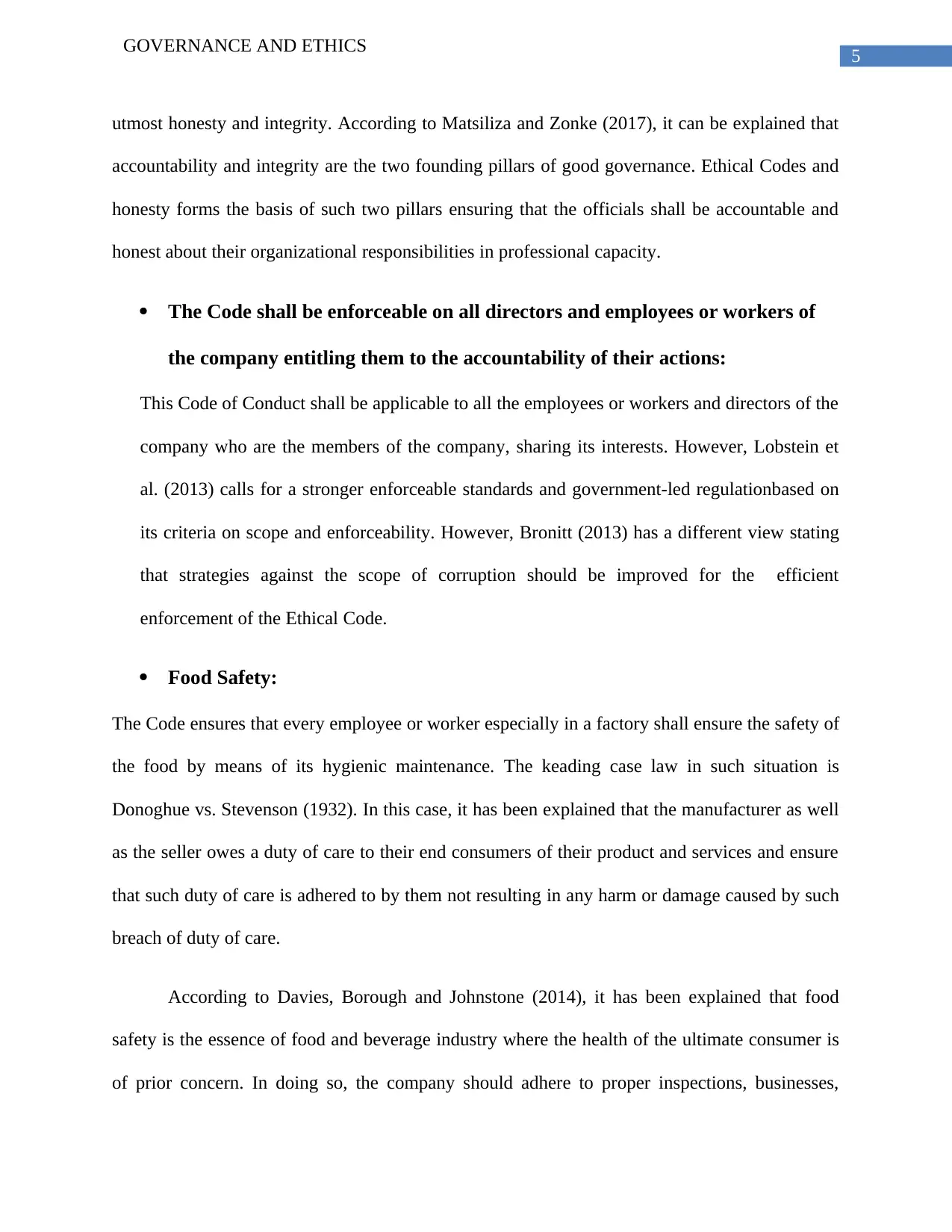
5
GOVERNANCE AND ETHICS
utmost honesty and integrity. According to Matsiliza and Zonke (2017), it can be explained that
accountability and integrity are the two founding pillars of good governance. Ethical Codes and
honesty forms the basis of such two pillars ensuring that the officials shall be accountable and
honest about their organizational responsibilities in professional capacity.
The Code shall be enforceable on all directors and employees or workers of
the company entitling them to the accountability of their actions:
This Code of Conduct shall be applicable to all the employees or workers and directors of the
company who are the members of the company, sharing its interests. However, Lobstein et
al. (2013) calls for a stronger enforceable standards and government-led regulationbased on
its criteria on scope and enforceability. However, Bronitt (2013) has a different view stating
that strategies against the scope of corruption should be improved for the efficient
enforcement of the Ethical Code.
Food Safety:
The Code ensures that every employee or worker especially in a factory shall ensure the safety of
the food by means of its hygienic maintenance. The keading case law in such situation is
Donoghue vs. Stevenson (1932). In this case, it has been explained that the manufacturer as well
as the seller owes a duty of care to their end consumers of their product and services and ensure
that such duty of care is adhered to by them not resulting in any harm or damage caused by such
breach of duty of care.
According to Davies, Borough and Johnstone (2014), it has been explained that food
safety is the essence of food and beverage industry where the health of the ultimate consumer is
of prior concern. In doing so, the company should adhere to proper inspections, businesses,
GOVERNANCE AND ETHICS
utmost honesty and integrity. According to Matsiliza and Zonke (2017), it can be explained that
accountability and integrity are the two founding pillars of good governance. Ethical Codes and
honesty forms the basis of such two pillars ensuring that the officials shall be accountable and
honest about their organizational responsibilities in professional capacity.
The Code shall be enforceable on all directors and employees or workers of
the company entitling them to the accountability of their actions:
This Code of Conduct shall be applicable to all the employees or workers and directors of the
company who are the members of the company, sharing its interests. However, Lobstein et
al. (2013) calls for a stronger enforceable standards and government-led regulationbased on
its criteria on scope and enforceability. However, Bronitt (2013) has a different view stating
that strategies against the scope of corruption should be improved for the efficient
enforcement of the Ethical Code.
Food Safety:
The Code ensures that every employee or worker especially in a factory shall ensure the safety of
the food by means of its hygienic maintenance. The keading case law in such situation is
Donoghue vs. Stevenson (1932). In this case, it has been explained that the manufacturer as well
as the seller owes a duty of care to their end consumers of their product and services and ensure
that such duty of care is adhered to by them not resulting in any harm or damage caused by such
breach of duty of care.
According to Davies, Borough and Johnstone (2014), it has been explained that food
safety is the essence of food and beverage industry where the health of the ultimate consumer is
of prior concern. In doing so, the company should adhere to proper inspections, businesses,
⊘ This is a preview!⊘
Do you want full access?
Subscribe today to unlock all pages.

Trusted by 1+ million students worldwide
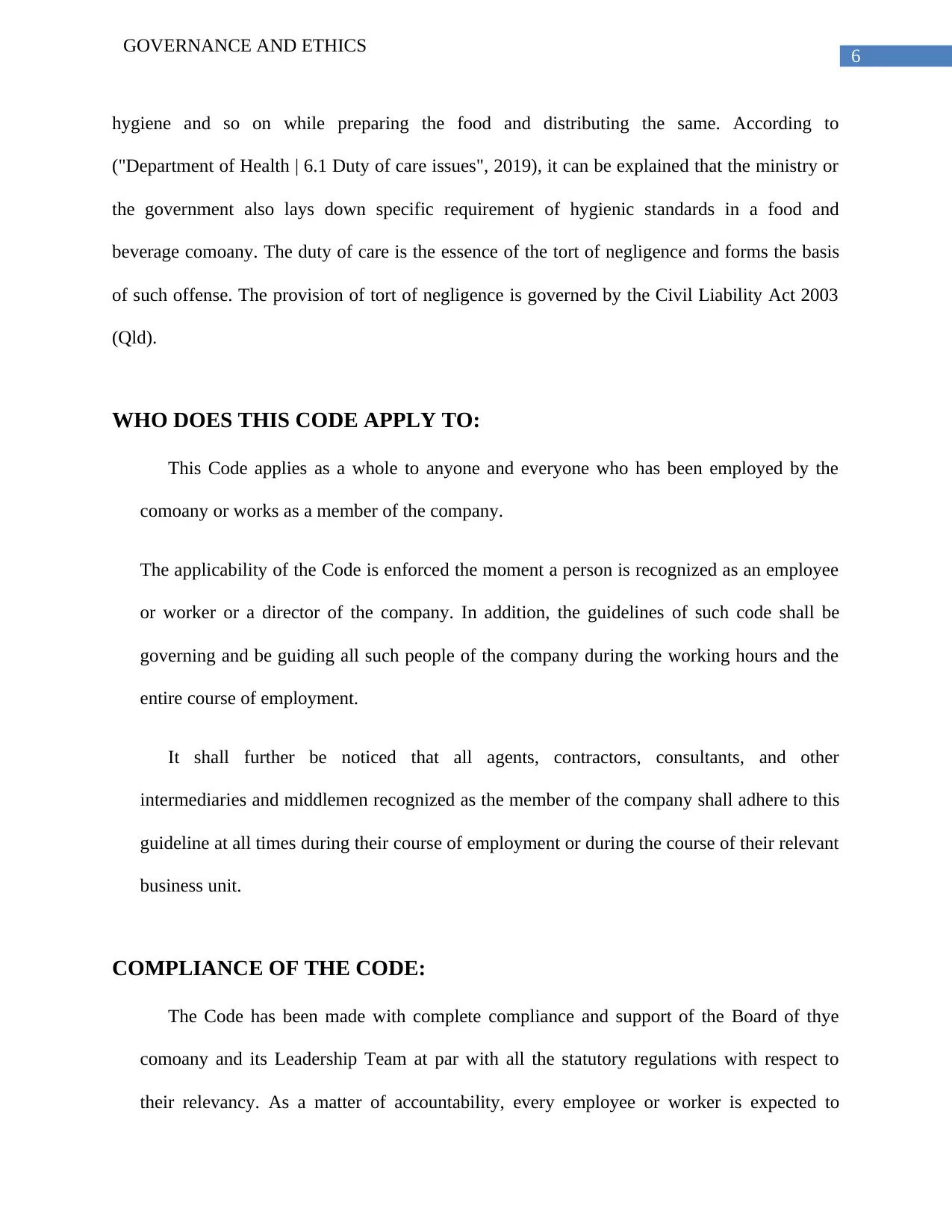
6
GOVERNANCE AND ETHICS
hygiene and so on while preparing the food and distributing the same. According to
("Department of Health | 6.1 Duty of care issues", 2019), it can be explained that the ministry or
the government also lays down specific requirement of hygienic standards in a food and
beverage comoany. The duty of care is the essence of the tort of negligence and forms the basis
of such offense. The provision of tort of negligence is governed by the Civil Liability Act 2003
(Qld).
WHO DOES THIS CODE APPLY TO:
This Code applies as a whole to anyone and everyone who has been employed by the
comoany or works as a member of the company.
The applicability of the Code is enforced the moment a person is recognized as an employee
or worker or a director of the company. In addition, the guidelines of such code shall be
governing and be guiding all such people of the company during the working hours and the
entire course of employment.
It shall further be noticed that all agents, contractors, consultants, and other
intermediaries and middlemen recognized as the member of the company shall adhere to this
guideline at all times during their course of employment or during the course of their relevant
business unit.
COMPLIANCE OF THE CODE:
The Code has been made with complete compliance and support of the Board of thye
comoany and its Leadership Team at par with all the statutory regulations with respect to
their relevancy. As a matter of accountability, every employee or worker is expected to
GOVERNANCE AND ETHICS
hygiene and so on while preparing the food and distributing the same. According to
("Department of Health | 6.1 Duty of care issues", 2019), it can be explained that the ministry or
the government also lays down specific requirement of hygienic standards in a food and
beverage comoany. The duty of care is the essence of the tort of negligence and forms the basis
of such offense. The provision of tort of negligence is governed by the Civil Liability Act 2003
(Qld).
WHO DOES THIS CODE APPLY TO:
This Code applies as a whole to anyone and everyone who has been employed by the
comoany or works as a member of the company.
The applicability of the Code is enforced the moment a person is recognized as an employee
or worker or a director of the company. In addition, the guidelines of such code shall be
governing and be guiding all such people of the company during the working hours and the
entire course of employment.
It shall further be noticed that all agents, contractors, consultants, and other
intermediaries and middlemen recognized as the member of the company shall adhere to this
guideline at all times during their course of employment or during the course of their relevant
business unit.
COMPLIANCE OF THE CODE:
The Code has been made with complete compliance and support of the Board of thye
comoany and its Leadership Team at par with all the statutory regulations with respect to
their relevancy. As a matter of accountability, every employee or worker is expected to
Paraphrase This Document
Need a fresh take? Get an instant paraphrase of this document with our AI Paraphraser
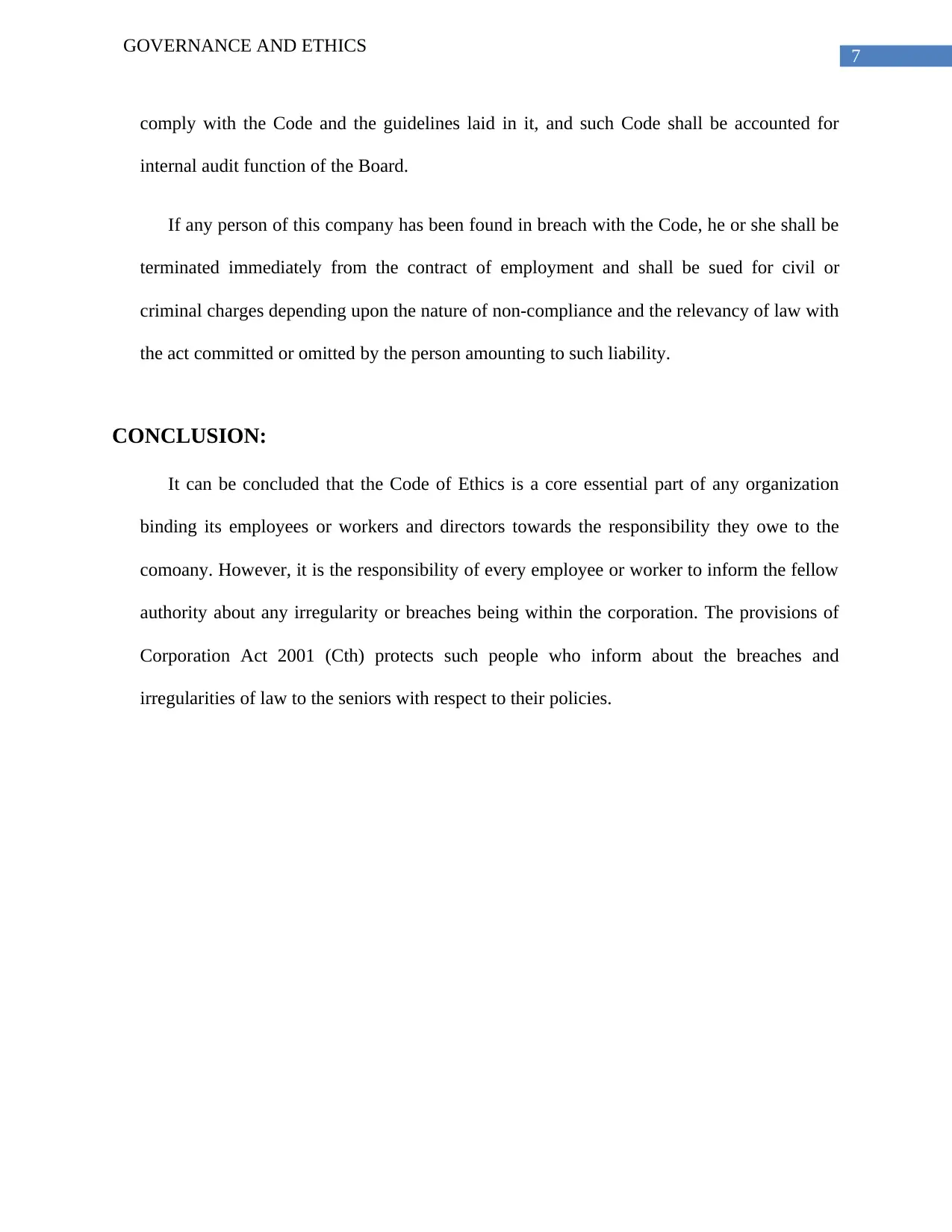
7
GOVERNANCE AND ETHICS
comply with the Code and the guidelines laid in it, and such Code shall be accounted for
internal audit function of the Board.
If any person of this company has been found in breach with the Code, he or she shall be
terminated immediately from the contract of employment and shall be sued for civil or
criminal charges depending upon the nature of non-compliance and the relevancy of law with
the act committed or omitted by the person amounting to such liability.
CONCLUSION:
It can be concluded that the Code of Ethics is a core essential part of any organization
binding its employees or workers and directors towards the responsibility they owe to the
comoany. However, it is the responsibility of every employee or worker to inform the fellow
authority about any irregularity or breaches being within the corporation. The provisions of
Corporation Act 2001 (Cth) protects such people who inform about the breaches and
irregularities of law to the seniors with respect to their policies.
GOVERNANCE AND ETHICS
comply with the Code and the guidelines laid in it, and such Code shall be accounted for
internal audit function of the Board.
If any person of this company has been found in breach with the Code, he or she shall be
terminated immediately from the contract of employment and shall be sued for civil or
criminal charges depending upon the nature of non-compliance and the relevancy of law with
the act committed or omitted by the person amounting to such liability.
CONCLUSION:
It can be concluded that the Code of Ethics is a core essential part of any organization
binding its employees or workers and directors towards the responsibility they owe to the
comoany. However, it is the responsibility of every employee or worker to inform the fellow
authority about any irregularity or breaches being within the corporation. The provisions of
Corporation Act 2001 (Cth) protects such people who inform about the breaches and
irregularities of law to the seniors with respect to their policies.
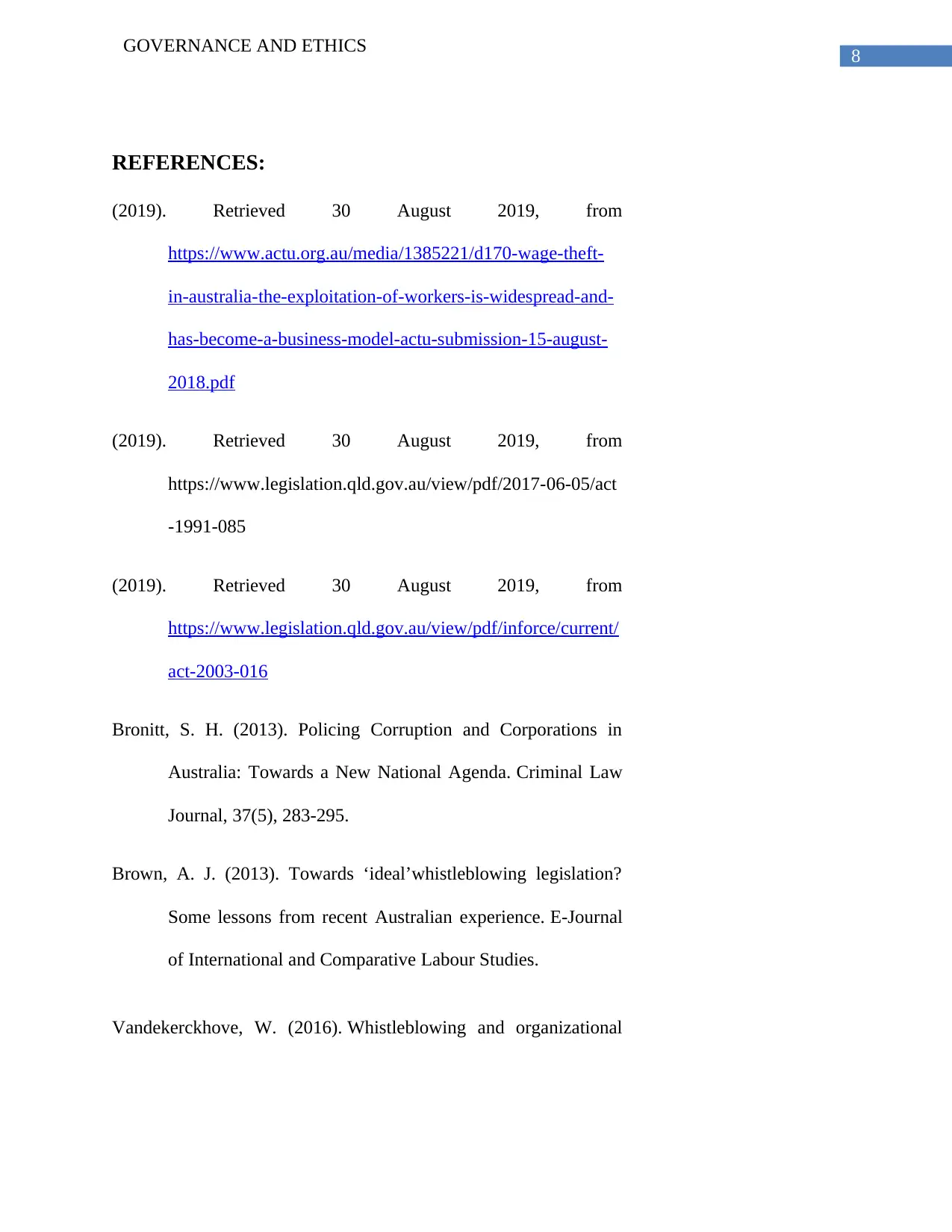
8
GOVERNANCE AND ETHICS
REFERENCES:
(2019). Retrieved 30 August 2019, from
https://www.actu.org.au/media/1385221/d170-wage-theft-
in-australia-the-exploitation-of-workers-is-widespread-and-
has-become-a-business-model-actu-submission-15-august-
2018.pdf
(2019). Retrieved 30 August 2019, from
https://www.legislation.qld.gov.au/view/pdf/2017-06-05/act
-1991-085
(2019). Retrieved 30 August 2019, from
https://www.legislation.qld.gov.au/view/pdf/inforce/current/
act-2003-016
Bronitt, S. H. (2013). Policing Corruption and Corporations in
Australia: Towards a New National Agenda. Criminal Law
Journal, 37(5), 283-295.
Brown, A. J. (2013). Towards ‘ideal’whistleblowing legislation?
Some lessons from recent Australian experience. E-Journal
of International and Comparative Labour Studies.
Vandekerckhove, W. (2016). Whistleblowing and organizational
GOVERNANCE AND ETHICS
REFERENCES:
(2019). Retrieved 30 August 2019, from
https://www.actu.org.au/media/1385221/d170-wage-theft-
in-australia-the-exploitation-of-workers-is-widespread-and-
has-become-a-business-model-actu-submission-15-august-
2018.pdf
(2019). Retrieved 30 August 2019, from
https://www.legislation.qld.gov.au/view/pdf/2017-06-05/act
-1991-085
(2019). Retrieved 30 August 2019, from
https://www.legislation.qld.gov.au/view/pdf/inforce/current/
act-2003-016
Bronitt, S. H. (2013). Policing Corruption and Corporations in
Australia: Towards a New National Agenda. Criminal Law
Journal, 37(5), 283-295.
Brown, A. J. (2013). Towards ‘ideal’whistleblowing legislation?
Some lessons from recent Australian experience. E-Journal
of International and Comparative Labour Studies.
Vandekerckhove, W. (2016). Whistleblowing and organizational
⊘ This is a preview!⊘
Do you want full access?
Subscribe today to unlock all pages.

Trusted by 1+ million students worldwide
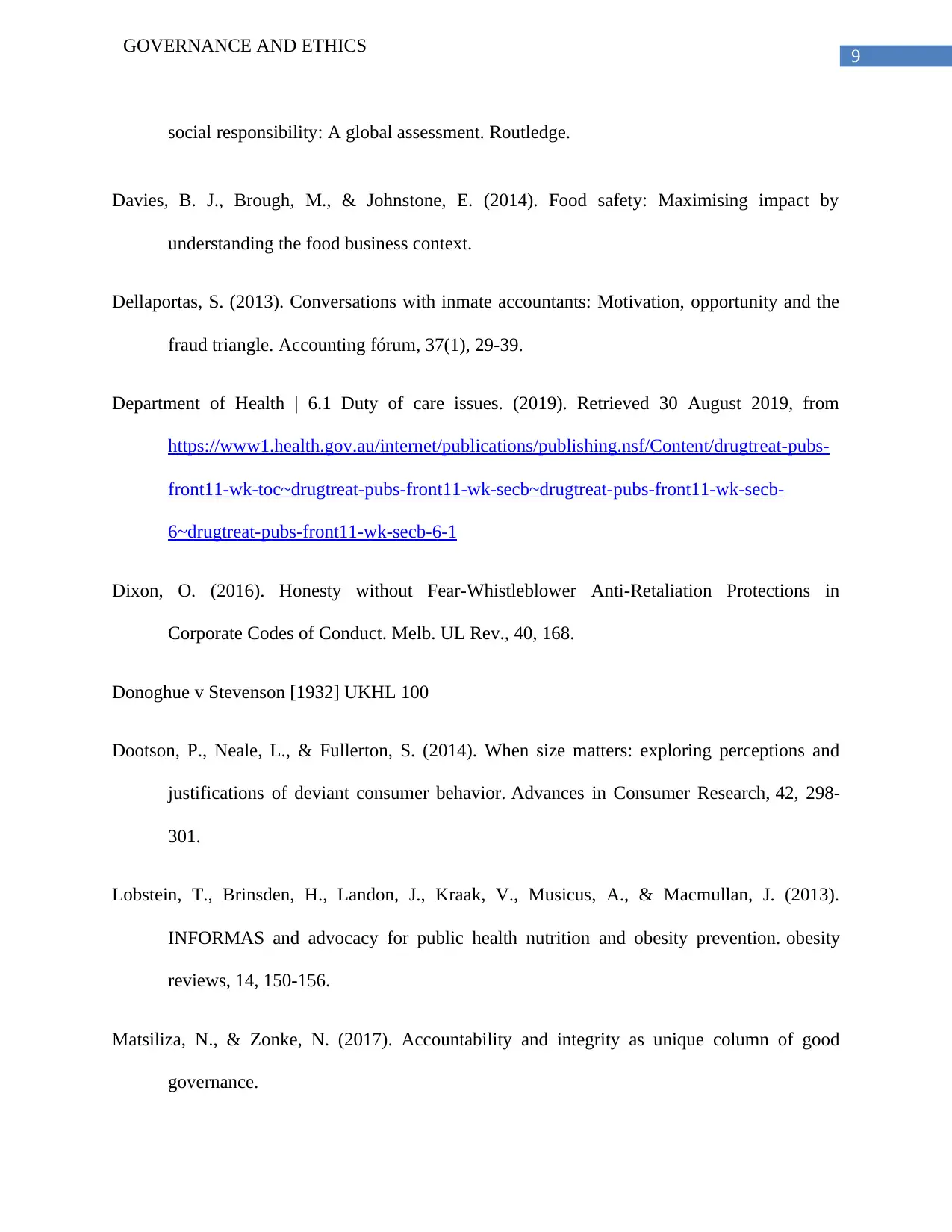
9
GOVERNANCE AND ETHICS
social responsibility: A global assessment. Routledge.
Davies, B. J., Brough, M., & Johnstone, E. (2014). Food safety: Maximising impact by
understanding the food business context.
Dellaportas, S. (2013). Conversations with inmate accountants: Motivation, opportunity and the
fraud triangle. Accounting fórum, 37(1), 29-39.
Department of Health | 6.1 Duty of care issues. (2019). Retrieved 30 August 2019, from
https://www1.health.gov.au/internet/publications/publishing.nsf/Content/drugtreat-pubs-
front11-wk-toc~drugtreat-pubs-front11-wk-secb~drugtreat-pubs-front11-wk-secb-
6~drugtreat-pubs-front11-wk-secb-6-1
Dixon, O. (2016). Honesty without Fear-Whistleblower Anti-Retaliation Protections in
Corporate Codes of Conduct. Melb. UL Rev., 40, 168.
Donoghue v Stevenson [1932] UKHL 100
Dootson, P., Neale, L., & Fullerton, S. (2014). When size matters: exploring perceptions and
justifications of deviant consumer behavior. Advances in Consumer Research, 42, 298-
301.
Lobstein, T., Brinsden, H., Landon, J., Kraak, V., Musicus, A., & Macmullan, J. (2013).
INFORMAS and advocacy for public health nutrition and obesity prevention. obesity
reviews, 14, 150-156.
Matsiliza, N., & Zonke, N. (2017). Accountability and integrity as unique column of good
governance.
GOVERNANCE AND ETHICS
social responsibility: A global assessment. Routledge.
Davies, B. J., Brough, M., & Johnstone, E. (2014). Food safety: Maximising impact by
understanding the food business context.
Dellaportas, S. (2013). Conversations with inmate accountants: Motivation, opportunity and the
fraud triangle. Accounting fórum, 37(1), 29-39.
Department of Health | 6.1 Duty of care issues. (2019). Retrieved 30 August 2019, from
https://www1.health.gov.au/internet/publications/publishing.nsf/Content/drugtreat-pubs-
front11-wk-toc~drugtreat-pubs-front11-wk-secb~drugtreat-pubs-front11-wk-secb-
6~drugtreat-pubs-front11-wk-secb-6-1
Dixon, O. (2016). Honesty without Fear-Whistleblower Anti-Retaliation Protections in
Corporate Codes of Conduct. Melb. UL Rev., 40, 168.
Donoghue v Stevenson [1932] UKHL 100
Dootson, P., Neale, L., & Fullerton, S. (2014). When size matters: exploring perceptions and
justifications of deviant consumer behavior. Advances in Consumer Research, 42, 298-
301.
Lobstein, T., Brinsden, H., Landon, J., Kraak, V., Musicus, A., & Macmullan, J. (2013).
INFORMAS and advocacy for public health nutrition and obesity prevention. obesity
reviews, 14, 150-156.
Matsiliza, N., & Zonke, N. (2017). Accountability and integrity as unique column of good
governance.
Paraphrase This Document
Need a fresh take? Get an instant paraphrase of this document with our AI Paraphraser
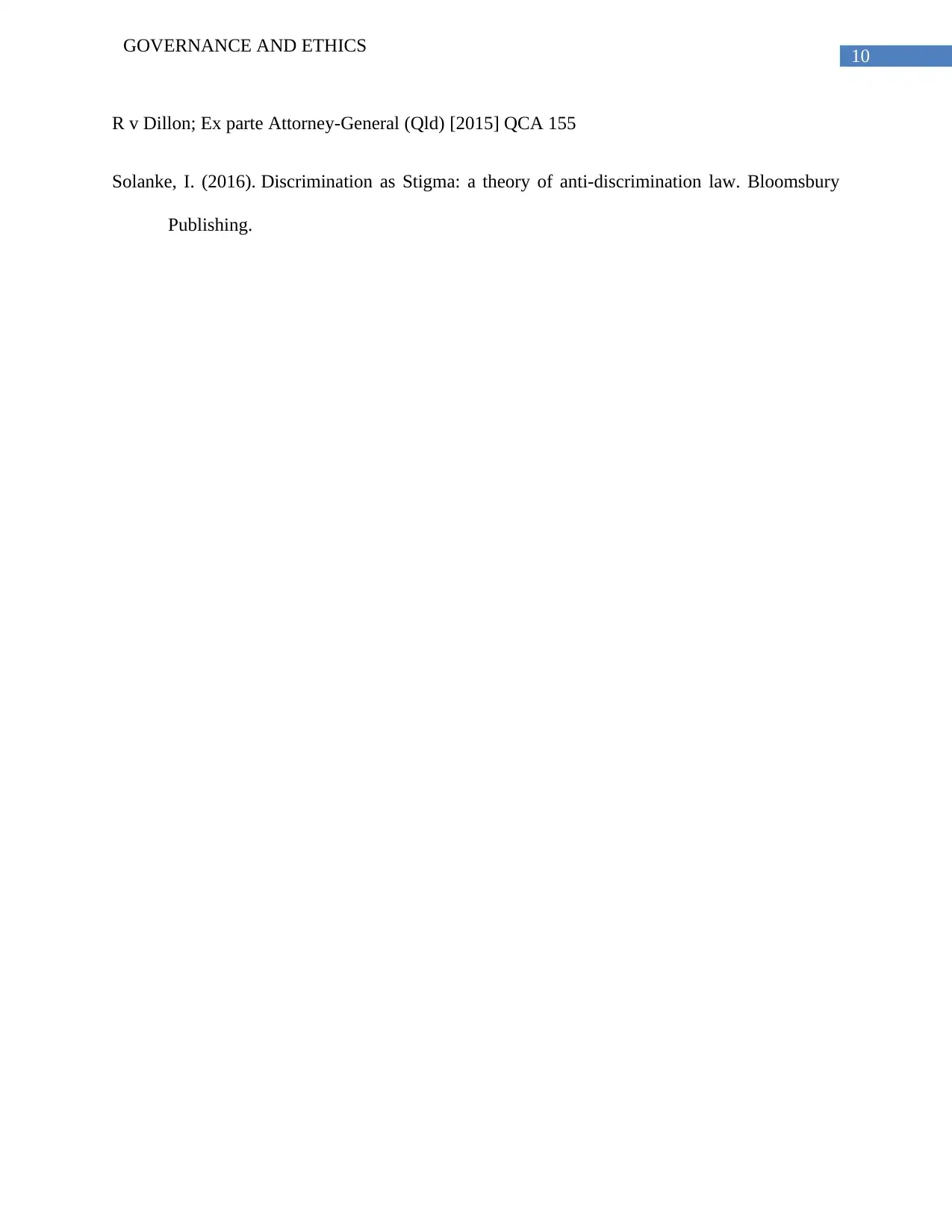
10
GOVERNANCE AND ETHICS
R v Dillon; Ex parte Attorney-General (Qld) [2015] QCA 155
Solanke, I. (2016). Discrimination as Stigma: a theory of anti-discrimination law. Bloomsbury
Publishing.
GOVERNANCE AND ETHICS
R v Dillon; Ex parte Attorney-General (Qld) [2015] QCA 155
Solanke, I. (2016). Discrimination as Stigma: a theory of anti-discrimination law. Bloomsbury
Publishing.
1 out of 11
Related Documents
Your All-in-One AI-Powered Toolkit for Academic Success.
+13062052269
info@desklib.com
Available 24*7 on WhatsApp / Email
![[object Object]](/_next/static/media/star-bottom.7253800d.svg)
Unlock your academic potential
Copyright © 2020–2026 A2Z Services. All Rights Reserved. Developed and managed by ZUCOL.





